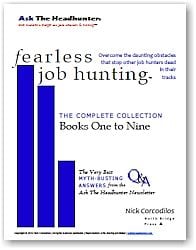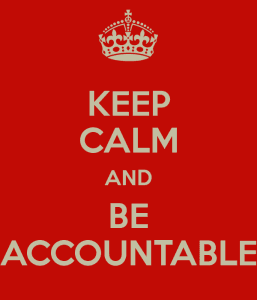In the December 22, 2015 Ask The Headhunter Newsletter, we talk about how to work with headhunters.
Is it good to work with many headhunters? That’s a question I am asked a lot. You might be surprised at my answer — and at the risks you face if you don’t know what you’re doing. These two Q&As are from “Section 2: Working With Headhunters to Get Ahead” of the best-selling How To Work With Headhunters… and how to make headhunters work for you, pp. 52-53.
 Question
Question
How many headhunters should I work with at a time? And how do you gauge when it’s time to increase your exposure to more of them?
Nick’s Reply
Don’t confuse real headhunters with people who solicit your resume blindly. These might include employment agencies, job shops and HR recruiters who work within corporations. (See They’re not headhunters.)
Many of these not-headhunters may approach you. Giving them your resume indiscriminately is like giving your credit card number to every telemarketer who calls. You won’t like having lots of recruiters working with you, especially if two or more of them give your resume to the same company.
Don’t let a headhunter’s conflict of interest cost you a job
If, somehow, multiple headhunters approach you at the same time, then you need to know just one thing: Do they each represent a different company?
If yes, then you’d be looking at different job opportunities and it’s fine to work with all of them at once. There should be no overlap in their assignments and no conflict for you.
If there is an overlap, then one company is unwisely using multiple contingency headhunters to fill the same position. (To learn more about contingency headhunters, see How should headhunters fit into your job search?) The company is putting its headhunters into competition with one another. That’s like assigning two sales reps to sell to the same prospect — the company reveals poor judgment and sloppy hiring practices.
Even so, you can still entertain an opportunity, but you would be wise to let just one headhunter present you to the company. Otherwise, you will likely be rejected out of hand because the company could wind up in the middle of a fee fight.
Who would be due the fee if you were hired? If the company interviews you via two headhunters — even if it’s for two completely different jobs — and then hires you, it could owe the fee twice. Don’t get in the middle of it. Work with only one headhunter at a time with respect to a particular employer.
Know what you’re doing
So the answer to your question has two parts. First, understand that if a lot of “headhunters” are soliciting you, it’s probably not wise to work with them because they have not carefully selected you. They are merely interested in blasting your resume around, hoping for a hit. Second, if two or more headhunters contact you about different jobs at different companies, it’s fine to work with all of them — as long as you are sure they are not going to run into one another. This is why it’s so important to control your resume. You must insist that each headhunter take no action on opportunities other than those you discuss specifically.
Question
Is there a way to get multiple headhunters to call on me about legitimate job opportunities?
Nick’s Reply
There are indeed ways to get on the radar to attract multiple good headhunters who want to talk with you about multiple unrelated jobs at different companies. If you want to be visible to good headhunters and lure their calls, then you must use bait. This isn’t easy and it’s not for everyone. (Headhunters don’t want everyone.)
Good bait includes:
- Writing industry articles in respected publications. Headhunters read these to identify the opinion-makers in an industry.
- Getting noticed in the professional industry press. The only thing better than writing articles is articles written about you. Headhunters notice.
- Speaking at a conference or industry event. Headhunters sometimes start searches by turning to prominent sources, and that includes prominent events.
- Being the subject of respectful discussion among notable members of your profession. Headhunters tap into such dialogues in person, online and via e-mail. Professionals tend to talk about the people they respect. That’s who headhunters want.
The quality of the venue matters a lot. For example, just because you blog or someone blogged about you doesn’t mean headhunters will find you. The venue might be big or niche, but its reputation must be solid.
Get the idea? You need to get yourself out there. That’s how headhunters find you. (See Good Headhunters: They search for living resumes.) And that’s the crux of the Ask The Headhunter approach to job hunting.
Don’t appear desperate
Most people who want headhunters’ attention take the heavily advertised path, which usually leads nowhere. They promote themselves brazenly. They send their resumes to lots of headhunters using one of the many “headhunter directories” published in paper format or online. I think you’d be wasting your time.
The odds that a headhunter is going to place you are small. If it makes you feel good to flood the headhunting industry with your resume, that’s up to you. My concern is that you will lull yourself into thinking you are conducting a job search when all you’re doing is throwing darts at a wall. And you will make yourself seem desperate for attention. Good headhunters don’t pursue desperate people.
I hope you enjoyed this excerpt from How To Work With Headhunters… and how to make headhunters work for you!
Want more?
Don’t miss these 62 in-your-face questions answered in a 130-page guide that reads like a series of conversations over a cup of coffee with the headhunter who put the profit equation back into job hunting and hiring. Includes:
- Why don’t headhunters return my calls?
- What’s the secret to getting on a headhunter’s list?
- How can I become the headhunter’s #1 candidate?
- How can I find a good headhunter?
- And much, much more!
 What are your rules for working with headhunters? Have you been burned?
What are your rules for working with headhunters? Have you been burned?
A very Merry Christmas, Happy New Year, Happy Hanukkah to you and yours — and anything else you celebrate!
: :


 My skill set wasn’t developed by being average, and I will not accept anything average. I make my employer lots of money. I impact the bottom line and that will cost you.
My skill set wasn’t developed by being average, and I will not accept anything average. I make my employer lots of money. I impact the bottom line and that will cost you.


